This article was co-authored by Hilary Jacobs Hendel, LCSW. Hilary Jacobs Hendel is a Certified Accelerated Experiential Dynamic Psychotherapy (AEDP) Psychotherapist and Emotions Educator (Accelerated Experiential Dynamic Psychotherapy based in New York City. With almost 20 years of experience, she specializes in helping people understand emotions and how they affect the mind through The Change Triangle tool. Hilary is also the author of It’s Not Always Depression: Working the Change Triangle to Listen to the Body, Discover Core Emotions, and Connect to Your Authentic Self, which was the winner of the 2018 Best Book Award in the Mental Health/Psychology Category and the 2018 Silver Nautilus Award for Personal Growth (Large Publisher). Hilary has published articles in The New York Times, TIME magazine, Oprah.com, NBC Think, Salon.com, and Fox News. She was also the psychological consultant on AMC’s Mad Men. Hilary is also the co-developer of the Emotions Education 101Turnkey Curriculum. She holds a BA in Biochemistry from Wesleyan University and a Master’s in Social Work from Fordham University.
There are 15 references cited in this article, which can be found at the bottom of the page.
wikiHow marks an article as reader-approved once it receives enough positive feedback. In this case, several readers have written to tell us that this article was helpful to them, earning it our reader-approved status.
This article has been viewed 164,046 times.
Do you find it hard to relax and go with the flow? If so, you're not alone. A lot of us struggle to not take things so seriously, but the good news is that it's completely possible to change your perspective and lighten up. To help you out, we've compiled the best strategies for developing a more carefree, positive attitude in life. Keep reading to get started today!
Steps
Letting Go of Expectations and Negativity
-
1Get rid of expectations of yourself and others. The inability to lighten up can sometimes begin with expectations of yourself or others. Letting go of the “wants,” “needs,” “musts,” and “have to’s,” can not only help you begin to lighten up, but may also limit the negativity around you that your seriousness.[1] Remember to be compassionate with yourself.[2]
- Learn to let go of the concept of perfection. Nothing is perfect. Imperfection adds character and letting go of any expectations of perfection will help you to relax and focus on the positive in any person or situation.
-
2Avoid stressful situations. Stress can be one of the most significant factors in the inability to lighten up. Avoiding stressful situations may minimize tension, cultivate positivity, and help you lighten up more generally.[3]
- Step back from any stressful situation if you can. If you cannot, try taking a deep breath and not reacting immediately to avoid having your feelings and tension rise unnecessarily.[4]
- Allow time during your day to relax and decompress. For example, a 10-minute walk may help you relieve and avoid unnecessary stress.[5]
Advertisement -
3Release your tension.[6] Tension can contribute to feelings of seriousness and rigidity. Releasing tension through activities such as exercise or massage can help you to relax and lighten up.
- Regular exercise is an important part of staying healthy and it can also help relieve tension-causing stress.[7]
- Exercise produces endorphins that will improve your mood and help you sleep, both of which can contribute to feelings of tension.[8] Even a light walk can help.[9]
- A massage can help relax you and remove the physical symptoms of tension that your seriousness may cause.[10]
- Even something as simple as taking a warm bath can help release your tension, especially after a stressful day or when you’re feeling negative.[11] [12]
-
4Limit negativity. Negative thoughts turn into negative actions and attitudes. Limiting the negativity in your life can help you to lighten up and create more positivity in your environment.[13]
- Ask yourself questions like “What’s the worst that could happen?” and “If it does happen, can I live with it?”
- Whenever something bad happens, forget it as much as possible and then actively imagine things you want to happen.
- If a person has negative commentary, consider it briefly and then let it go.[14] Dwelling on negativity will only reinforce tension and seriousness.[15]
-
5Forgive yourself and others. Holding grudges and dwelling on your imperfections will only emphasize a negative attitude and seriousness. Forgiving yourself and others can minimize tension, allow you to focus on the positive in yourself and others, and teach you to lighten up.[16]
- The act of forgiveness can remove negativity and create positivity attitudes. But it will also decrease stress and increase peace and calm in your life.[17]
-
6Limit or remove negative people from your life. The people with whom we surround ourselves have a significant impact on us. Limiting or removing the negative and serious people in your life and replacing them with positive and amusing people will start helping you to lighten up.[18]
- If you can’t remove a person from your life entirely, or you don’t want to hurt him, you can limit your exposure to him. You can also counteract his negative attitudes and viewpoints by pointing out the positive in what he says or does. This way, you don’t get drawn down his negative path.[19]
-
7Be willing to bend the rules. Rules exist to help direct and guide us as well as provide sensible parameters. But when the rules become the means by which you relate to yourself or others, it makes you rigid and stubborn. Learn to be flexible on where you can bend the rules to help you lighten up and help improve your relationships with others.[20]
- You want to make sure you’re bending and not breaking the rules. For example, you might consider driving the wrong way down a parking lot instead of parking in a handicapped space when you are not disabled.
- At work, you could take a slightly longer lunch break one day and stay later or take a shorter lunch another day.
-
8
Finding Humor and Positivity
-
1See the humor and positive in every situation. Even the most difficult situations likely have some positive and humorous moments. They may not be immediately clear, but being able to recognize them and laugh will help you to lighten up in the long term.[23]
- Negative thoughts and attitudes are draining and can reinforce seriousness. Seeking out the positive in any person or situation will help shift lighten up.[24]
- Some studies have found that a positive attitude can contribute significantly to success and happiness.[25]
- For example, if you fall and scrape your knee, don’t focus on the cut or a tear in your clothing, but learn to laugh at your clumsiness or something else humorous that happened in the situation.
-
2Laugh at yourself. Part of being able to find the humor in any situation is having the ability to laugh at yourself. Not only can this help you lighten up and relax, but may also help keep everyone around you relaxed.[26]
- Being able to see the humor in your imperfections can help you accept yourself and show others that you don’t take yourself too seriously.[27]
-
3Surround yourself with positive, supportive, and humorous people. Having positive, supportive, and humorous people around you who can help cultivate a positive attitude and teach you to lighten up. Surrounding yourself with positive people can also help counteract negativity.[28]
- These people don’t necessarily have to agree with everything you do, but they should tell you the truth without judging you in any way.[29]
- Positive friends and colleagues not only always have your best interest at heart, but can also help you to learn to trust yourself and in turn not take yourself too seriously.[30]
-
4Expose yourself to humorous situations. Medical research supports the old truism “laughter is the best medicine.”[31] Exposing yourself to humor through jokes or media such as movies can help relieve stress and not be so rigid and serious.[32]
- Any type of laughing is good so long as it’s not at someone else’s expense. Consider watching funny movies or TV shows, reading humorous books, or simply seeing a comic to elicit laughs. All of these will give you a chance to relax and lighten up.[33]
-
5Set up a daily meditation practice. Meditation is a powerful method to improve focus and relax. Allot a few minutes of every day to meditate to reap its benefits of improved concentration and relaxation, and in turn, see how it can help you to lighten up.[34]
- Humans have practiced different forms of meditation for thousands of years. It has had different purposes, from finding inner illumination to relaxing and learning to concentrate.
- Meditation forces you to truly unplug from the world and focus internally. Having this unplugged time can teach you to concentrate and relax.
- Start with 5-10 minutes of meditation daily and gradually increase your time as you become more proficient at meditating.[35]
- Notice and write down at least 3 things you are grateful for, big and small. It can help you improve your mood and well-being.
-
6Sit upright and still and close your eyes. Proper posture is a vital part of meditation. It allows your breath and blood to flow, which helps your brain learn to focus on one point. Closing your eyes will help keep distractions at bay.[36]
- Find a quiet and comfortable place where you’ll be uninterrupted. By eliminating any distractions, it is easier to focus on your breath and let go of any thoughts or sensations that arise.
- Breathe easily and evenly. Don’t control your breath; rather, let it come and go. An excellent technique to help your concentration is to focus solely on your breath by saying “let” on the inhale and “go” on the exhale.[37]
- If you lose your inner concentration during your meditation session, take a deep breath and refocus your energy inwards. It’s completely normal for this to happen, especially as you develop your meditation practice.
-
7Do gentle yoga. Gentle yoga can help stretch out your tense muscles and more generally relax you. Even taking the time to do downward facing dog for ten breaths can help relax and refocus you, and in turn, help you to lighten up.
- Try doing gentle forms of yoga, which will stretch muscles and relax you. Restorative and yin yoga are specifically practiced to help stretch out and repair muscles and relax the body.[38]
- If you don’t have the time to commit to a full yoga session, do downward facing dog for 10 deeps inhalations and exhalations. Adho mukha savasana, which is the Sanskrit name for downward facing dog, is an important foundational pose in yoga that will not only calm and relax you but will also stretch and strengthen your Practicing regularly may help you lighten up.
- Talk to your doctor before you begin any yoga practice to make sure you’re healthy enough to practice.
Expert Q&A
-
QuestionHow do I get my partner to lighten up?
 Hilary Jacobs Hendel, LCSWHilary Jacobs Hendel is a Certified Accelerated Experiential Dynamic Psychotherapy (AEDP) Psychotherapist and Emotions Educator (Accelerated Experiential Dynamic Psychotherapy based in New York City. With almost 20 years of experience, she specializes in helping people understand emotions and how they affect the mind through The Change Triangle tool. Hilary is also the author of It’s Not Always Depression: Working the Change Triangle to Listen to the Body, Discover Core Emotions, and Connect to Your Authentic Self, which was the winner of the 2018 Best Book Award in the Mental Health/Psychology Category and the 2018 Silver Nautilus Award for Personal Growth (Large Publisher). Hilary has published articles in The New York Times, TIME magazine, Oprah.com, NBC Think, Salon.com, and Fox News. She was also the psychological consultant on AMC’s Mad Men. Hilary is also the co-developer of the Emotions Education 101Turnkey Curriculum. She holds a BA in Biochemistry from Wesleyan University and a Master’s in Social Work from Fordham University.
Hilary Jacobs Hendel, LCSWHilary Jacobs Hendel is a Certified Accelerated Experiential Dynamic Psychotherapy (AEDP) Psychotherapist and Emotions Educator (Accelerated Experiential Dynamic Psychotherapy based in New York City. With almost 20 years of experience, she specializes in helping people understand emotions and how they affect the mind through The Change Triangle tool. Hilary is also the author of It’s Not Always Depression: Working the Change Triangle to Listen to the Body, Discover Core Emotions, and Connect to Your Authentic Self, which was the winner of the 2018 Best Book Award in the Mental Health/Psychology Category and the 2018 Silver Nautilus Award for Personal Growth (Large Publisher). Hilary has published articles in The New York Times, TIME magazine, Oprah.com, NBC Think, Salon.com, and Fox News. She was also the psychological consultant on AMC’s Mad Men. Hilary is also the co-developer of the Emotions Education 101Turnkey Curriculum. She holds a BA in Biochemistry from Wesleyan University and a Master’s in Social Work from Fordham University.
Certified AEDP Psychotherapist & Emotions Educator Encourage them to practice self-compassion. We live in a dysfunctional society that tells us we should get over something very quickly, or that we shouldn't feel our emotions or dwell on them. Remind your partner that it's more than okay to feel strong emotions about things—that realization might help clear away some of their guilt and shame.
Encourage them to practice self-compassion. We live in a dysfunctional society that tells us we should get over something very quickly, or that we shouldn't feel our emotions or dwell on them. Remind your partner that it's more than okay to feel strong emotions about things—that realization might help clear away some of their guilt and shame. -
QuestionWhy do I feel so lazy and tired?
 Erin Conlon, PCC, JDErin Conlon is an Executive Life Coach, the Founder of Erin Conlon Coaching, and the host of the podcast "This is Not Advice." She specializes in aiding leaders and executives to thrive in their career and personal lives. In addition to her private coaching practice, she teaches and trains coaches and develops and revises training materials to be more diverse, equitable, and inclusive. She holds a BA in Communications and History and a JD from The University of Michigan. Erin is a Professional Certified Coach with The International Coaching Federation.
Erin Conlon, PCC, JDErin Conlon is an Executive Life Coach, the Founder of Erin Conlon Coaching, and the host of the podcast "This is Not Advice." She specializes in aiding leaders and executives to thrive in their career and personal lives. In addition to her private coaching practice, she teaches and trains coaches and develops and revises training materials to be more diverse, equitable, and inclusive. She holds a BA in Communications and History and a JD from The University of Michigan. Erin is a Professional Certified Coach with The International Coaching Federation.
Executive Life Coach If you're experiencing fatigue and a lack of productivity, try looking inward. Are you taking care of yourself? How is your well-being? Do you like what you do? If you don't like the work that you do, it's going to be really hard to be productive in it.
If you're experiencing fatigue and a lack of productivity, try looking inward. Are you taking care of yourself? How is your well-being? Do you like what you do? If you don't like the work that you do, it's going to be really hard to be productive in it. -
QuestionHow do you tell someone such as your spouse that they probably need to lighten up?
 Paul Chernyak, LPCPaul Chernyak is a Licensed Professional Counselor in Chicago. He graduated from the American School of Professional Psychology in 2011.
Paul Chernyak, LPCPaul Chernyak is a Licensed Professional Counselor in Chicago. He graduated from the American School of Professional Psychology in 2011.
Licensed Professional Counselor It's probably best to not tell them directly but to be lighter yourself around them and lead by example. Telling them would be similar to telling someone to smile when they don't feel like it. It would just be rude and create a more defensive attitude.
It's probably best to not tell them directly but to be lighter yourself around them and lead by example. Telling them would be similar to telling someone to smile when they don't feel like it. It would just be rude and create a more defensive attitude.
References
- ↑ https://www.psychologytoday.com/blog/happiness-purpose/201309/lighten-and-laugh
- ↑ Hilary Jacobs Hendel, LCSW. Certified AEDP Psychotherapist & Emotions Educator. Expert Interview. 8 September 2021.
- ↑ http://tinybuddha.com/blog/stop-being-hard-on-yourself-5-tips-for-learning-life-lessons/
- ↑ http://talentdevelop.com/articles/HowtoLightenUp.html
- ↑ http://tinybuddha.com/blog/stop-being-hard-on-yourself-5-tips-for-learning-life-lessons/
- ↑ Hilary Jacobs Hendel, LCSW. Certified AEDP Psychotherapist & Emotions Educator. Expert Interview. 8 September 2021.
- ↑ http://www.mayoclinic.org/healthy-lifestyle/stress-management/in-depth/exercise-and-stress/art-20044469
- ↑ http://www.mayoclinic.org/healthy-lifestyle/stress-management/in-depth/exercise-and-stress/art-20044469
- ↑ Hilary Jacobs Hendel, LCSW. Certified AEDP Psychotherapist & Emotions Educator. Expert Interview. 8 September 2021.
- ↑ http://www.calmclinic.com/anxiety/signs/muscle-tension
- ↑ http://www.calmclinic.com/anxiety/signs/muscle-tension
- ↑ Hilary Jacobs Hendel, LCSW. Certified AEDP Psychotherapist & Emotions Educator. Expert Interview. 8 September 2021.
- ↑ http://tinybuddha.com/blog/stop-being-hard-on-yourself-5-tips-for-learning-life-lessons/
- ↑ Erin Conlon, PCC, JD. Executive Life Coach. Expert Interview. 31 August 2021.
- ↑ http://tinybuddha.com/blog/stop-being-hard-on-yourself-5-tips-for-learning-life-lessons/
- ↑ http://tinybuddha.com/blog/stop-being-hard-on-yourself-5-tips-for-learning-life-lessons/
- ↑ http://tinybuddha.com/blog/stop-being-hard-on-yourself-5-tips-for-learning-life-lessons/
- ↑ https://www.psychologytoday.com/blog/happiness-purpose/201309/lighten-and-laugh
- ↑ http://tinybuddha.com/blog/10-tips-to-overcome-negative-thoughts-positive-thinking-made-easy/
- ↑ http://talentdevelop.com/articles/HowtoLightenUp.html
- ↑ Erin Conlon, PCC, JD. Executive Life Coach. Expert Interview. 31 August 2021.
- ↑ https://www.psychologytoday.com/blog/happiness-purpose/201309/lighten-and-laugh
- ↑ https://www.psychologytoday.com/blog/happiness-purpose/201309/lighten-and-laugh
- ↑ http://tinybuddha.com/blog/stop-being-hard-on-yourself-5-tips-for-learning-life-lessons/
- ↑ http://tinybuddha.com/blog/stop-being-hard-on-yourself-5-tips-for-learning-life-lessons/
- ↑ https://www.psychologytoday.com/blog/happiness-purpose/201309/lighten-and-laugh
- ↑ https://www.psychologytoday.com/blog/happiness-purpose/201309/lighten-and-laugh
- ↑ http://talentdevelop.com/articles/HowtoLightenUp.html
- ↑ http://talentdevelop.com/articles/HowtoLightenUp.html
- ↑ http://talentdevelop.com/articles/HowtoLightenUp.html
- ↑ http://www.mayoclinic.org/healthy-lifestyle/stress-management/in-depth/stress-relief/art-20044456
- ↑ http://www.mayoclinic.org/healthy-lifestyle/stress-management/in-depth/stress-relief/art-20044456
- ↑ http://www.mayoclinic.org/healthy-lifestyle/stress-management/in-depth/stress-relief/art-20044456
- ↑ http://www.ananda.org/meditation/meditation-support/articles/increase-your-concentration/
- ↑ http://www.ananda.org/meditation/getting-started/meditation-basics/
- ↑ http://www.ananda.org/meditation/getting-started/meditation-basics/
- ↑ http://www.ananda.org/meditation/getting-started/meditation-basics/
- ↑ http://www.yinyoga.com/newsletter13_restorativeyin.php
About This Article
To lighten up, try to see the humor and positivity in every situation. For example, if you fall and scrape your knee, instead of focusing on the cut or torn clothing, laugh at your own clumsiness. You should also ignore negative thoughts by asking yourself questions like “What’s the worst that could happen?”. Instead, image good things you want to happen. Additionally, try to release your tension through exercise, gentle yoga, or meditation practices. For more tips from our Counselor co-author, including how to forgive yourself and others, keep reading!




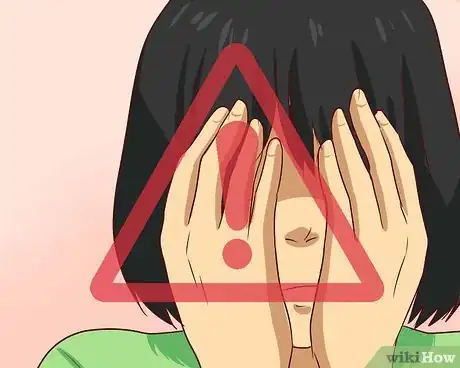



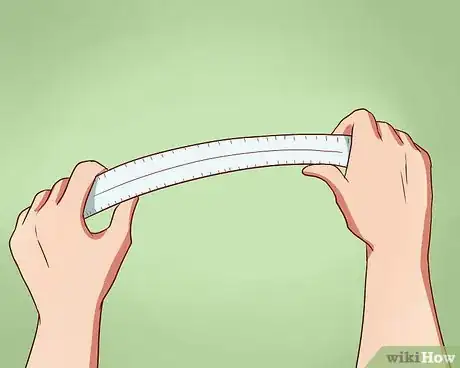





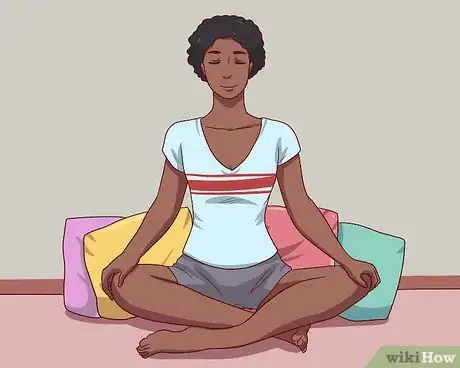
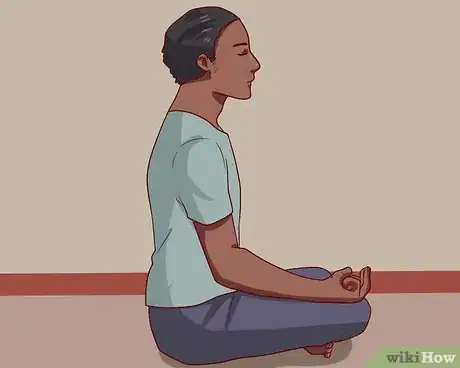
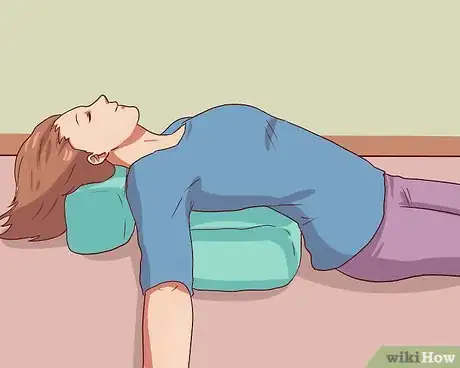





























































Medical Disclaimer
The content of this article is not intended to be a substitute for professional medical advice, examination, diagnosis, or treatment. You should always contact your doctor or other qualified healthcare professional before starting, changing, or stopping any kind of health treatment.
Read More...